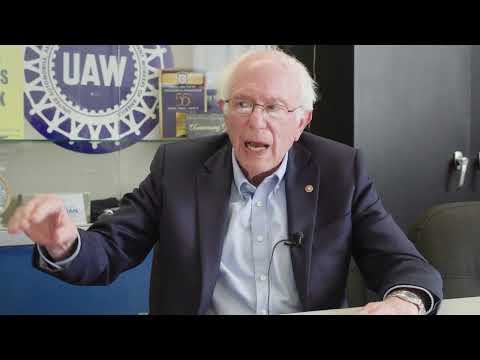Vermont Sen. Bernie Sanders brought his firebrand politics to Parma recently to rally support for a proposed minimum wage amendment to the Ohio Constitution. It would raise the minimum wage to $15 by 2026 for employees not earning tips and for all workers by 2029. Sanders has been championing a national minimum wage for years in Congress and currently wants to raise it to $17 a hour.
Sanders, an independent, urged the large crowd at the United Auto Workers Local 1005 to back Ohio’s proposal and to help collect signatures to get it before voters in November. The campaign said it has more than the needed 413,000 voter signatures.
But the rally had an air of urgency around signature gathering, which has become increasingly difficult and expensive. Typically, on such statewide ballot campaigns, tens of thousands of signatures are rejected because they are not from registered voters. (Other speakers at the rally said backers need to hit upcoming festivals across the state before the July 3 deadline.)
The bulk of Sanders’ remarks reflected the themes that fueled his two presidential runs: the system is rigged against workers, pharmaceutical companies are ripping off people, climate change is real and billionaires love the status quo.
Before his speech, I asked Sanders why workers he is urging to support a living wage amendment – including those represented by the auto workers union – have abandoned Democrats in recent elections.
“That is a very fair question and certainly true in the Midwest,” he said. ”And I think to a significant degree, it has to do with bad trade policies brought forth by Democrats, Bill Clinton and others. And I think to a significant degree Democrats have, at least the Democratic leadership, has kind of turned its back on working people.”
Sanders, however, said his visit was not about identity politics.
“What I’m here to do today is bring working people together and say, ‘Enough is enough.’” he said. “Hey, radical idea, why don’t we create an economy that works for all of us?”
Lawyering on legal weed
Ohio lawyers are required to take 24 hours of continuing legal education classes every two years to stay up to date on the law and ethics. Some offerings sound as exciting as waiting to pay a parking ticket, such as this offered earlier this year: “Administrative Law: Statutory Changes You Should Know.” (No offense to the administrative law lovers out there.)
But a class offered this week through the Cleveland Metropolitan Bar Association stood out for both its timeliness and potential class experiments. “Let’s be Blunt. Should lawyers light up?” offered participants 1.5 hours of credit to “engage in a robust discussion on whether employees, especially attorneys, should partake in cannabis use.”
Curious about turnout, Signal Cleveland reached out to the Cleveland Metropolitan Bar.
“Seventy-five people attended,” said Brennan Donnellan, the bar’s director of marketing. “I believe it was a lively debate between lawyers and discussed employment practices, whether marijuana affects you days after ingesting it, and how it is treated versus other prescription drugs and alcohol. One participant summarized that ‘The jury is still out!’”





